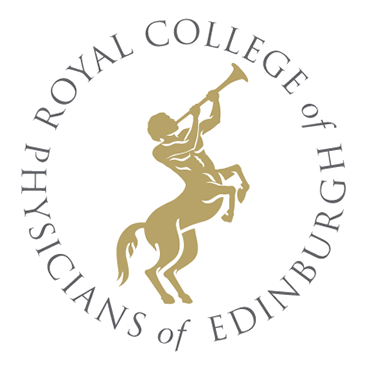
The Consultation Letters of Dr William Cullen (1710-1790) at the Royal College of Physicians of Edinburgh
[ID:2412] From: Mr James Boswell / To: Dr William Cullen (Professor Cullen) / Regarding: Dr Samuel Johnson (Patient) / 7 March 1784 / (Incoming)
Letter from James Boswell, concerning the case of Dr Samuel Johnson, who has 'been very ill for some time'.
- Facsimile
- Normalized Text
- Diplomatic Text
- Metadata
- Case
- People
- Places
Facsimile
There are 4 images for this document.
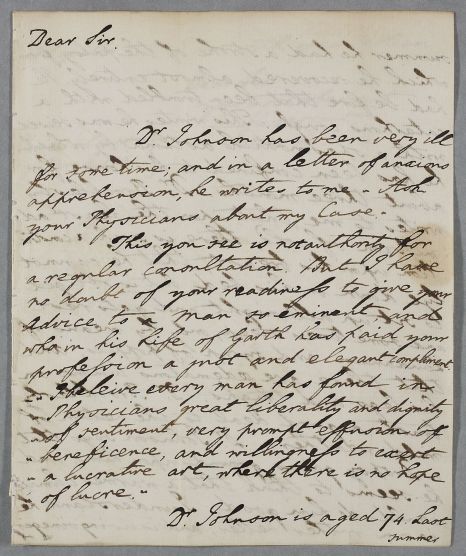
[Page 1]
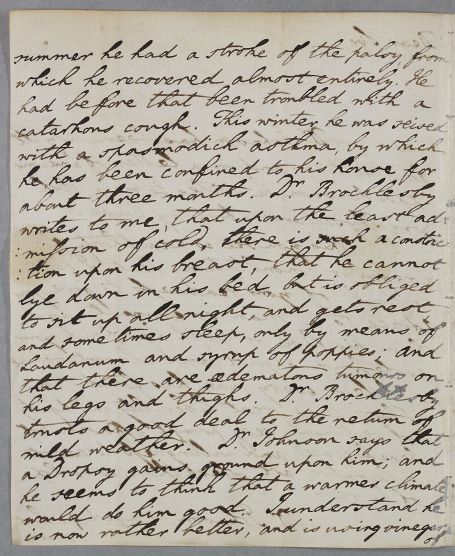
[Page 2]
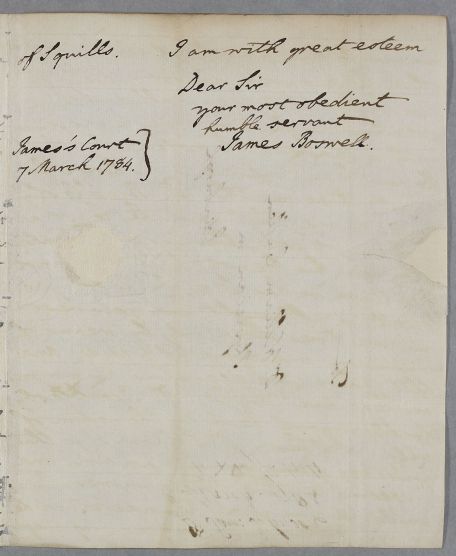
[Page 3]
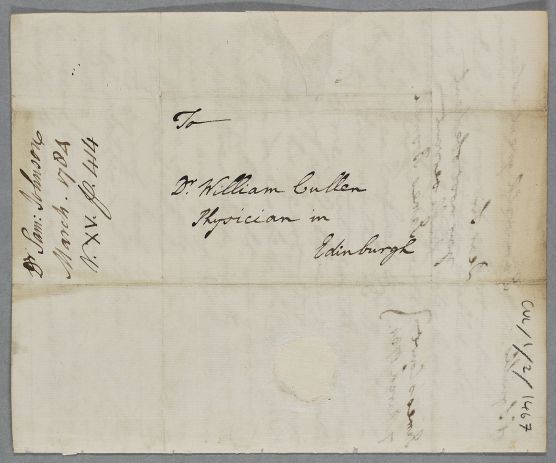
[Page 4]
Metadata
| Field | Data |
|---|---|
| DOC ID | 2412 |
| RCPE Catalogue Number | CUL/1/2/1467 |
| Main Language | English |
| Document Direction | Incoming |
| Date | 7 March 1784 |
| Annotation | None |
| Type | Authorial original |
| Enclosure(s) | No enclosure(s) |
| Autopsy | No |
| Recipe | No |
| Regimen | No |
| Letter of Introduction | No |
| Case Note | No |
| Summary | Letter from James Boswell, concerning the case of Dr Samuel Johnson, who has 'been very ill for some time'. |
| Manuscript Incomplete? | No |
| Evidence of Commercial Posting | No |
Case
Cases that this document belongs to:
| Case ID | Description | Num Docs |
|---|---|---|
| [Case ID:1686] |
Case of Dr Samuel Johnson who has asthma and dropsy. |
2 |
People linked to this document
| Person ID | Role in document | Person |
|---|---|---|
| [PERS ID:470] | Author | Mr James Boswell |
| [PERS ID:1] | Addressee | Dr William Cullen (Professor Cullen) |
| [PERS ID:471] | Patient | Dr Samuel Johnson |
| [PERS ID:4336] | Patient's Physician / Surgeon / Apothecary | Dr Richard Brocklesby |
| [PERS ID:1] | Patient's Physician / Surgeon / Apothecary | Dr William Cullen (Professor Cullen) |
| [PERS ID:5912] | Other | Dr Samuel Garth |
Places linked to this document
| Role in document | Specific Place | Settlements / Areas | Region | Country | Global Region | Confidence |
|---|---|---|---|---|---|---|
| Place of Writing | James' Court | Edinburgh | Edinburgh and East | Scotland | Europe | inferred |
| Destination of Letter | Edinburgh | Edinburgh and East | Scotland | Europe | certain |
Normalized Text
Dr. Johnson has been very ill
for some time; and in a letter of anxious
apprehension, he writes to me - Ask
your Physicians about my Case. 1
This you see is not authority for
a regular consultation. But I have
no doubt of your readiness to give your
Advice to a Man so eminent, and
who in his Life of Garth 2 has paid your
profession a just and elegant compliment.
"I believe every man has found in
"Physicians great liberality and dignity
"of sentiment, very prompt effusion of
"beneficence, and willingness to exert
"a lucrative art, where there is no hope
"of lucre."‘ 3 .
Dr. Johnson is aged 74. 4 Last
[Page 2]
summer he had a stroke of the palsy, from
which he recovered almost entirely. He
had before that been troubled with a
catarhous cough. This winter he was seised
with a spasmodick asthma, 5 by which
he has been confined to his house 6 for
about three months. Dr. Brocklesby 7
writes to me, that upon the least ad¬
mission of cold, there is such a constric¬
tion upon the breast, that he cannot
lye down in his bed, but is obliged
to sit up all night, and gets rest
and some times sleep, only by means of
Laudanum and syrup of poppies; And
that there are œdematous tumours on
his legs and thighs. Dr. Brocklesby
trusts a good deal to the return of
mild weather. Dr. Johnson says that
a Dropsy gains ground upon him; and
he seems to think that a warmer climate
would do him good. I understand he
is now rather better, and is using vinegar
[Page 3]
of Squills.
I am with great esteem
Dear Sir
Your most obedient
humble servant
[Page 4]
To
Dr. William Cullen
Physician in
Edinburgh
Dr. Sam: Johnson
March. 1784
V. XV. p.414
Notes:
1: Johnson had dined with Cullen in Edinburgh on the evening of 16 August, 1773, when the physician ‘talked, in a very entertaining manner, of people walking and conversing in their sleep’ (Frederick A. Pottle and Charles H. Bennet (eds) Boswell’s Journal of a Tour to the Hebrides with Samuel Johnson, LL.D. 1773 (Melbourne, London, Toronto: Heinemann, 1963), p. 7.
2: Johnson’s ‘Life of Garth’, first published in 1779 as part of what was later entitled The Lives of the Poets. Dr. Samuel Garth (1660/1-1719) combined the roles of doctor and poet. His most celebrated literary work is The Dispensary (1699) a mock-heroic poem depicting the professional rivalry between the London physicians and apothecaries as a burlesque Homeric battle.
3: 'I believe...no hope of lucre’ is an accurate quotation from Johnson’s ‘Life of Garth’ (see note above).
4: Samuel Johnson was born at Litchfield in Staffordshire on 18 September (N.S.) 1709.
5: Cullen specially addresses ‘spasmodick asthma’ in First Lines, pp. 403-6; and MM, p. 298; and 352.
6: Johnson lived at Gough Court in the City of London, the present-day 17 Gough Square, which is now a museum.
7: Dr. Richard Brocklesby (1722-1797), the London physician and medical author treated Johnson for the last eighteen months of his life. They became close friends.
8: Since 1771 Boswell and his family had been living in a tenement apartment in James’s Court, off the Lawnmarket in Edinburgh. It had formerly been the home of Cullen's associate, the philosopher David Hume.
Diplomatic Text
Dr. Johnson has been very ill
for some time; and in a letter of anxious
apprehension, he writes to me - Ask
your Physicians about my Case. 1
This you see is not authority for
a regular consultation. But I have
no doubt of your readiness to give your
Advice to a Man so eminent, and
who in his Life of Garth 2 has paid your
profession a just and elegant compliment.
"I believe every man has found in
"Physicians great liberality and dignity
"of sentiment, very prompt effusion of
"beneficence, and willingness to exert
"a lucrative art, where there is no hope
"of lucre."‘ 3 .
Dr. Johnson is aged 74. 4 Last
[Page 2]
summer he had a stroke of the palsy, from
which he recovered almost entirely. He
had before that been troubled with a
catarhous cough. This winter he was seised
with a spasmodick asthma, 5 by which
he has been confined to his house 6 for
about three months. Dr. Brocklesby 7
writes to me, that upon the least ad¬
mission of cold, there is such a constric¬
tion upon the breast, that he cannot
lye down in his bed, but is obliged
to sit up all night, and gets rest
and some times sleep, only by means of
Laudanum and syrup of poppies; And
that there are œdematous tumours on
his legs and thighs. Dr. Brocklesby
trusts a good deal to the return of
mild weather. Dr. Johnson says that
a Dropsy gains ground upon him; and
he seems to think that a warmer climate
would do him good. I understand he
is now rather better, and is using vinegar
[Page 3]
of Squills.
I am with great esteem
Dear Sir
Your most obedient
humble servant
[Page 4]
To
Dr. William Cullen
Physician in
Edinburgh
Dr. Sam: Johnson
March. 1784
V. XV. p.414
Notes:
1: Johnson had dined with Cullen in Edinburgh on the evening of 16 August, 1773, when the physician ‘talked, in a very entertaining manner, of people walking and conversing in their sleep’ (Frederick A. Pottle and Charles H. Bennet (eds) Boswell’s Journal of a Tour to the Hebrides with Samuel Johnson, LL.D. 1773 (Melbourne, London, Toronto: Heinemann, 1963), p. 7.
2: Johnson’s ‘Life of Garth’, first published in 1779 as part of what was later entitled The Lives of the Poets. Dr. Samuel Garth (1660/1-1719) combined the roles of doctor and poet. His most celebrated literary work is The Dispensary (1699) a mock-heroic poem depicting the professional rivalry between the London physicians and apothecaries as a burlesque Homeric battle.
3: 'I believe...no hope of lucre’ is an accurate quotation from Johnson’s ‘Life of Garth’ (see note above).
4: Samuel Johnson was born at Litchfield in Staffordshire on 18 September (N.S.) 1709.
5: Cullen specially addresses ‘spasmodick asthma’ in First Lines, pp. 403-6; and MM, p. 298; and 352.
6: Johnson lived at Gough Court in the City of London, the present-day 17 Gough Square, which is now a museum.
7: Dr. Richard Brocklesby (1722-1797), the London physician and medical author treated Johnson for the last eighteen months of his life. They became close friends.
8: Since 1771 Boswell and his family had been living in a tenement apartment in James’s Court, off the Lawnmarket in Edinburgh. It had formerly been the home of Cullen's associate, the philosopher David Hume.
XML
XML file not yet available.
Feedback
Send us specfic feeback about this document [DOC ID:2412]
Please note that the Cullen Project team have now disbanded but your comments will be logged in our system and we will look at them one day...

